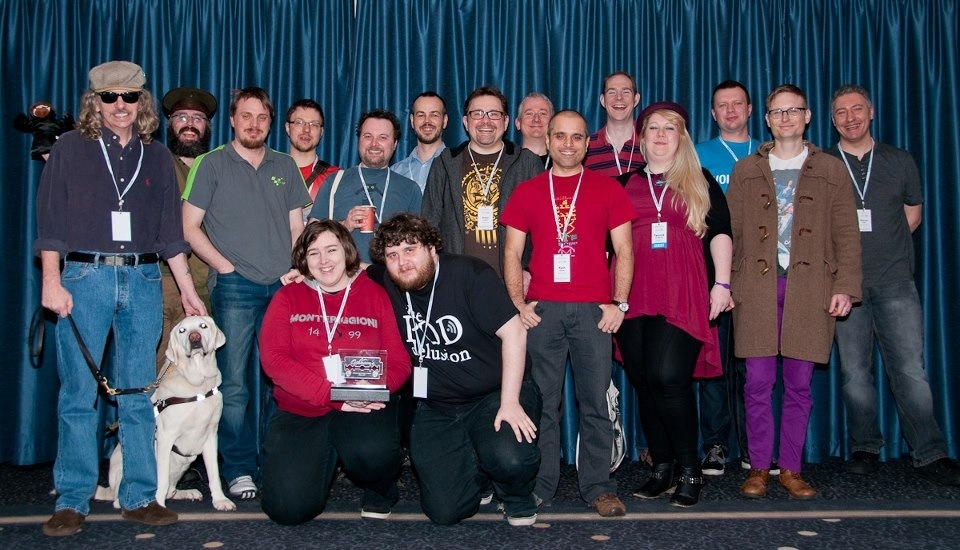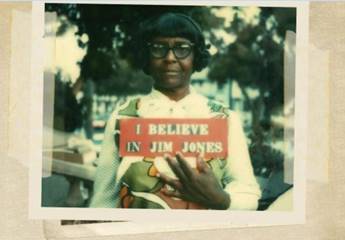Guest Post: Blog Against “Disablism” Day by Chris “Gonz Blinko” Hofstader

Today’s guest post is from Chris Hofstader (featured in a previous guest post) and concerns Blog Against Disablism Day. I am not eloquent enough to describe how compelling, thought-provoking, and eye-opening this post is for people who are not aware of the issues behind disablism, you just have to read it yourself.
————————————————
A number of advocates and activists who work on issues surrounding disability, including me, a middle aged blind person, have declared May 1, 2012, “Blog Against Disablism Day.” So, let’s start with a definition of the word. Disablism is a noun that means, “The discriminatory, oppressive, or abusive behavior arising from the belief that disabled people are inferior to others.”
The concept of disablism comes from critical disability theory (sometimes called disability studies), a field of theory and research regarding people with disabilities. If you’re interested in learning more about the scholarly framework and the different models it describes, you should use Google to find things of interest to you. In this essay, I’m going to focus on the personal side of disablism and illustrate some of its concepts with anecdotes from my own experience. As a matter of disclosure, I have been working in accessibility for about 15 years so I have a high level of expertise in the technology people like me can use, I’m very aware of ways to work around technical problems that are barriers for most blind people, I come from a reasonably wealthy family, and, in short, I have it a whole lot easier than the majority of others with disabilities around the world.
I do not believe that, like misogyny, disablism is born out of hatred. Rather, it is my opinion that it comes from a combination of fear and ignorance (willful or otherwise), a broad societal belief that people with disabilities are less than complete humans, and philosophy of people like Peter Singer who suggest that we are simply a burden on society and should be “cured or killed.”
Often, when I go to a restaurant that provides braille menus for its vision-impaired customers, the waitperson will softly asked a sighted person with me, “Would he like a braille menu?” Close friends and family who have spent a lot of time with me will, appropriately, respond by saying, “He’s not deaf and he’s sitting right there, ask him!” This often sends the waitperson into a momentary meltdown, and I can only assume they are thinking, “They’re forcing me to talk to a freak, how do I handle this?”
Assuming that a person with one disability can not do anything whatsoever is evidenced by cashiers who, after I hand them my credit card, ask, “Can you sign your name?” usually in a tremendously condescending tone. On some occasions, they’ve also made the same mistake as the waitperson and asked a sighted person I’m with the question. I hardly have an answer for them, “Of course, I have hands and no obvious other reason why I can’t sign my name you discriminatory moron.” Sometimes, being treated as a subhuman can cause rage to build and, sadly, I’ll yell at some poor, uneducated, minimum wage worker before I can compose myself back to a state in which I can be polite. I don’t think it is my role in the world to personally educate every person I encounter–it gets repetitive telling the same story over and over and seeing no actual change in the attitudes of most to whom I speak.
Some of the disablism comes in the form of incredibly fearful statements made by those who do not self-identify as having a disability. Recently, a good friend of mine saw one of her Facebook friends repeat an oft-made statement, “I’d rather die than go blind.” We’ll just assume that her belief system includes the notion that losing one’s vision is worse than death and that life without vision is her analogue of hell. Hearing our computers read such statements aloud even makes people who have had disabilities from birth hurt badly. The women who made the post, when informed of her hurtful statements, never posted anything saying that she realized how painful it was for us to read.
Religion plays its role in disablism. The Bible boasts of how Jesus used a miracle to allow the blind to see. If the god of the Bible thinks that it is a good idea for his son to “cure” people of blindness, why did he invent it in the first place? Is this god so awful that blindness and other disabilities were somehow considered to be a good idea in his plan? And, when his son fixed up two or three people, why didn’t he just wave his hand and make it all go away? If such a god exists, he’s really mean.
Islamic fundamentalists are even worse. Various Christian groups may hold the belief that their god created people with disabilities for some valid reason but Muslims who follow the Koran, believe that dogs are dirty and, therefore, shouldn’t be allowed in restaurants, other places of business, mosques, and, worst for me, taxis. A whole lot of Muslim taxi drivers have left me on a sidewalk, in a panic over getting another ride, because I have a service animal. In Boston, San Francisco, Miami Beach, and elsewhere, Muslim taxi drivers have refused to let my dog and I into their cabs, which is a violation of federal and most state laws because they put a phrase in an ancient document ahead of the civil rights of a person with a disability. (I’m not bigoted against Muslims, I think most people who follow Islam whom I’ve met are just like any other group, they have nice people and they have dicks. I do, however, object to anyone placing any notion from some sort of ancient text ahead of the civil rights of any people.)
Disablism enters the workplace in many ways, some of which are based entirely in willful ignorance and others from fear. On more than one job interview, I’ve been asked, “Do you think a blind person can do this job?” If such a question was asked of anyone from a racial or ethnic minority, they would have cause for legal action; asking a person with a disability this same question is allowed under US law–there are actually exemptions to fundamental US civil rights laws that specifically include our population. I’ve also been asked, “How can a blind person get to work?” as if buses, subways and sidewalks had all been removed and, in an entirely chauvinistic manner, they assume that the automobile is the only possible way one can get from one point to another.
When I was Vice President of Software Engineering at Freedom Scientific, then the world’s largest developer of software for people with vision impairment, I sent an internal email to our director of human resources complaining that the forms she created and wanted to require all of us manager-types to use had obviously never been checked for accessibility and said that it was ironic that the HR person at an access technology company could even consider doing something that discriminates against our own employees. A few hours I sent this email, our CEO came into my office to discuss the issue. I was expecting him to tell me that he would have everything fixed–a reasonable assumption as we were the world’s leading experts in such things. Instead, I was scolded and told, in no uncertain terms, that I’d be fired if I continued to put the civil rights of the community from which we made all of our income ahead of corporate unity. I was called divisive for simply asking that the tools I need to use at work be something possible for me, all of our other blind managers, and contractors to actually use.
For the first time in history, using a combination of mainstream and special-access technology designed to adapt mainstream technology, many people with disabilities have access to the Internet and lots of programs used in workplaces, educational institutions, and at home. To make technology accessible uses nothing beyond done science and relatively simple engineering. According to the United Nations Committee on Internet Accessibility, 97% of all web sites in the world contain “between one and many violations of accessibility standards and guidelines.” These sites also eschew the concepts of universal design, an inclusive design principle, to plod ahead, enforcing technological segregation.
In the world of skepticism/humanism/etc., some people (e.g. Rebecca Watson, Hayley Stevens, Keir Liddle, and others) took almost immediate action to remediate the accessibility problems on their sites and the organizers of the QED conference this year took many special steps to ensure the accessibility of their conference. Others have ignored the issue entirely. Recently, I sent a JREF Fellow some emails and tweets regarding the accessibility of their site. I included an MP3 of a speech synthesizer reading their page aloud (which is how I access web sites) demonstrating the problems. I explained the problems in detail and offered the solution and explained that it shouldn’t take more than a few hours to fix. I also offered my own time at no cost (typically $125 per hour) to help them with remediation, but a month later I still haven’t heard anything from them.
When SGU was working to update their website, I wrote to Jay Novella, apparently the brother tasked with the website project, to make a similar offer to him to help with accessibility. Jay sent me an email that said, “Thanks for your offer but accessibility is simply not a priority right now.” It seems that this sort of thinking is probably also why SGU rarely engages in discussions of a broader, more social skepticism topic discussions. Clearly, excepting the wonderful Rebecca Watson, they don’t want to challenge the fundamental belief system held by them and any other group of reasonably well-educated, middle- to upper-middle class, white male Connecticut residents on necessary social policies. I find it ironic that such discriminatory behavior is what defines a “rogue” but, alas, few white men even understand the concept of what a real rogue is, i.e. one who takes action and challenges on issues that are far outside of a safe suburban home.
On a purely linguistic note, the term CAPTCHA includes the phrase, “to tell humans and computers apart.” A CAPTCHA will sometimes have an audio equivalent to solve but both the visual and audio versions are typically so garbled and mixed up that many people with pretty good vision and hearing cannot use them. Organizations that use such are telling people with disabilities, us blind people, people who are both deaf and blind, people with learning, cognitive and intellectual disabilities, and others that we are not human enough to use their websites.
So, as you, a reader of Skepchick, probably do not self-identify as having a disability, why should you care about disablism and the horrible effects it has on people with disabilities?
First, according to the United Nations Convention on Civil Rights, Dignity, and People with Disabilities, we are, “The world’s largest and most disenfranchised minority on Earth.” Nearly a billion strong, people with disabilities aren’t a big enough population in any specific locale to make a difference through democratic processes–we’re too few to influence the outcome of an election. The only way to improve our civil and human rights is through legislation, regulation, and enforcement of the same. We cannot effect this sort of change on our own, so please help us by talking to your elected officials and telling them to both improve legislation already on the books and to expand full constitutional rights, all of the same rights afforded all other Americans, to our population. We are, after all, humans and deserve the same human rights as anyone else.
Second, the population described as “people with disabilities” is the only minority you can join in an instant. On Monday, April 15, of this year, I sat in a hotel bar in Bath, England with my friend and great disability rights thinker, Alastair Somerville. We were discussing this same concept, anyone can join this club in a matter of seconds. Not ten minutes later, he looked at his phone and saw a tweet from a mutual friend saying that the bombs had gone off at the Boston marathon. After a few deep sighs and some sad silence, we both knew immediately that some of the victims would, like me and others with disabilities, never again enjoy a life without discrimination.
Granted, being a victim of a terrorist bombing is highly unlikely anywhere in the world but there is a panoply of other ways to become an instant minority. I know people who became disabled in automobile accidents, from war injuries, from an accident in a chemical plant, from a hang glider accident, from a gunshot wound, pick your favorite type of accident and it probably applies. If you are, in the horrible disaster that makes you into one of us, I cannot reassure you that things will ever approach your definition of “normal” again.
Lastly, we are also the only minority that, if you live long enough, you will eventually join. Aging and disability are closely tied. Fifteen or twenty years ago, elders with various disabilities were easily ignored. Culturally, these people didn’t care about much involving technology or most other accessibility issues as it was generally assumed that old people stay at home and wait to die. Today, however, a 75-year-old individual, a person who started their career 50 years ago, has used technology for most of their professional life and, more recently, speaking to my parents (age 77), an 88-year-old retired veterinarian friend, and viewing purchasing statistics among retirees of technology products, I have come to the conclusion that these people aren’t going to lose their desire to be connected via the Internet with their friends and families, do online shopping, play games, make phone calls, and do everything that anyone else can do with their devices. Ask yourself, will you be happy to give up your civil rights and ability to do many things that would be simple to provide when you get older and acquire a disability?
————————————————
Afterword
Special thanks to Rebecca Watson and Mary Brock of Skepchick for allowing me to post this article here. On May 1, I will also have an item about “Vocabulary and Disability” on my personal blog at hofstader.com, which will be more specific, not include personal anecdote, but will be loaded with jargon specific to accessible technology and critical disability theory. If you’re interested in digging in further, check out my blog on on or after May 1 and, perhaps, follow me on Twitter (@gonz_blinko) on May 1 as I’ll be retweeting other Blog Against Disablism Day posts as they appear.
About the Author
Chris Hofstader blogs at hofstader.com and The 21st Floor (the blog of the Edinburgh Skeptics Society). He contributes to Pod Delusion, the podcast of the British Humanist Association, works on disability rights issues, writes the occasional bit of accessibility-related software and hosts a few web sites. He’s been in the accessibility field since 1998 and enjoys life as a crackpot. He and his lovely dog X-Celerator will be attending the Women in Secularism conference in mid-May, so if you’re there too, come say “hi” to us.
Featured Image: Chris Hofstader with his adorable service dog X-Celerator







Great post, thank you so much for sharing your perspective.
And big thanks to Rebecca and the Skepchick crew for not only reminding us that we all have blind spots and that we may be inadvertently mistreating other people even while we seek recognition and equality ourselves. Your empathy should be an example and inspiration to us all.
ditto!
Thank you for this post. It was enlightening.
Hilarious picture of you in your Microsoft Visual-C++ shirt and X-Celerator playing with his Apple iPad. There’s got to be some deeper meaning here, like “Why can’t we all just get along?” or “It’s my turn!”
I was wondering if iPads (and other tablet devices) have any sort of useful accessibility options, since the interface seems so intrinsically visual (there’s that word again)? I thought just asking you would be fairly obnoxious, so I Googled it, and sure enough, they have a mode to announce the names and status of the icons as you touch them or slide your finger, then give you the opportunity to tap to activate them. Then read the contents of web sites, electronic books, and other text through the speaker or headphones. And lots of other nifty-sounding features, such as special gestures and support for Bluetooth Braille displays. I assume/hope that Android and Windows-based tablets are similar. There are similar features for audio accessibility.
But all the good tools in the world obviously can’t overcome cleverly bad design, or inaccessible web sites and applications wouldn’t be an issue.
So the important question arises, is there a Dog mode? Or is that unnecessary because on the Internet, no one knows X-Celerator is a dog?
Yeah, similar technology is built into Android at least. (I’m actually part of a dev team that is, among other things, retrofitting a certain Major Online Retailer’s mp3 store to follow the necessary accessibility guidelines for it to all work.) The big problem is that a lot of web sites are built in such a way that their ostensible structure (as defined by HTML) bears no relation to the pretty pictures on the screen you actually see as a sighted user (as defined by CSS+HTML), and screen readers mostly rely on the HTML structure. (There are Aural CSS properties specifically for screenreaders, but I’d guess a majority of professional web devs don’t even *know* that).
Thanks for this post, Chris! It was a really great, if depressing, read. My mouth literally dropped open reading about how you were reprimanded for bringing an accessibility issue to the notice of your employer.
Key, that. I’m pretty certain the reason my employer started getting its accessibility act together in double time recently was because they did the market research and found out that neglecting the elderly was a Very Bad Thing for the bottom line. (Especially for our market positioning– un”sexy” basically commodified mobile hardware with an ease-of-use focused ecosystem.)
Thank you for this. It was extremely informative. You’ve given me a lot to think about.